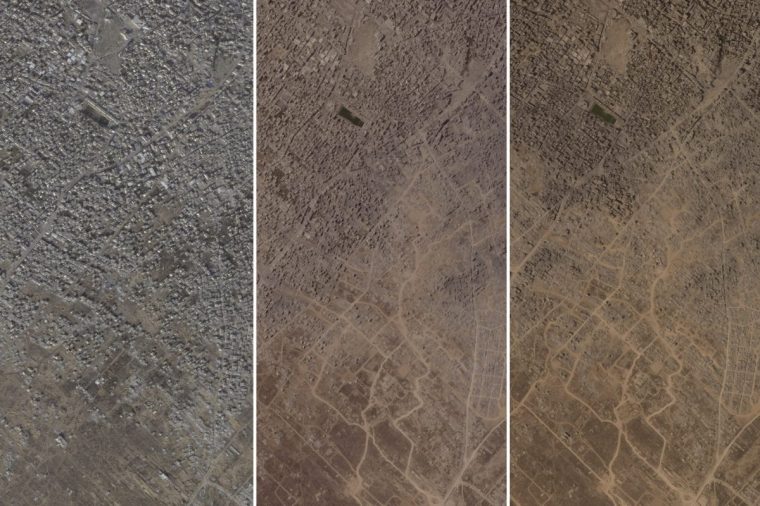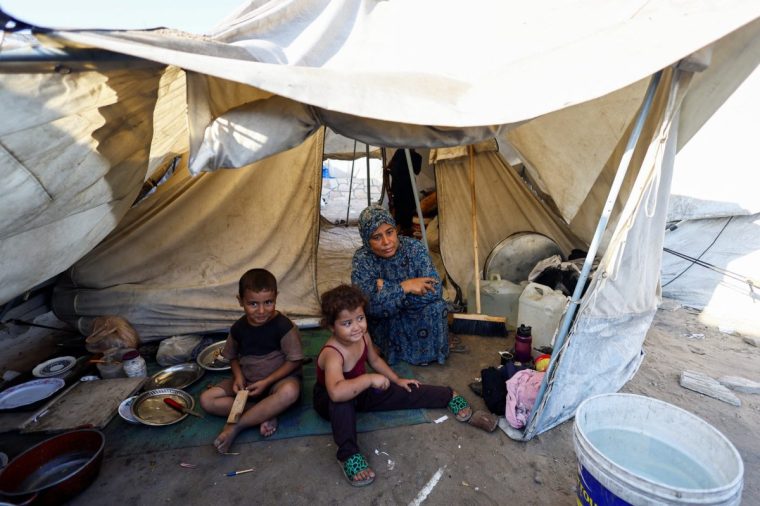‘$850 for a tent’: Gaza City residents can’t afford to flee Israeli offensive
As Israel escalates operations to capture and occupy Gaza City, the city’s 800,000 residents are facing orders to flee in what would be among the largest displacements of the war. But some will take their chances under the bombs.
The military began the offensive by attacking the eastern neighbourhoods of Zeitoun and Sabra with air strikes, drones and tanks. Few buildings were left standing. Israeli forces are now advancing towards the crowded centre.
Israel has ordered residents to flee south to already overcrowded camps in the south of the Gaza Strip. Tens of thousands have fled over the past weeks, according to the UN.
Those who remain describe tension and confusion as the bombardment intensifies. Many have experienced repeated displacements before, and now face a gruelling, dangerous and expensive journey south.
Salam Asraf, 45, from the central Sheikh Radwan neighbourhood, said his family fled their home after it came under fire.
“A few days ago, the army fired a quadcopter drone bomb at the roof of the house, so we decided to evacuate,” he said. “We moved to my sister’s house in the Shati camp in western Gaza City… far from the danger in the east of the city and the outskirts of the centre.”
Asraf said he considered heading south to the largest displacement camp in Mawasi on the south coast, but was deterred by rocketing prices.

“Renting a place to put up a tent on a plot of land costs about $850 (£633). This is a crazy price that we did not see before the war. For a space that is not 4m in area. I also need to transport my belongings in a car that costs $300 (£223). This is money we do not have because of the high prices since the beginning of the war.”
The family will stay in Shati for now, said Asraf, adding that if the danger becomes too great, “I will be forced to flee south…to save my family”.
While some families are charged a flat fee for a tent space in southern camps, others pay monthly rent of more than $300, with land owners raising rates as demand increases for the few remaining areas Israel has not closed access to.
In some cases, costs for transport and a tent with a toilet can exceed $3,000 (£2,234), says Amjad al-Shawa, head of the Palestinian NGOs network in Gaza.
“And 90 per cent of the population lost their incomes during the war so they cannot cover these costs,” he said. “At the same time, it’s unsafe with daily attacks on Mawasi and other places, which are overcrowded with no services, very limited water and health facilities.”
Palestinian and international sources in Gaza told The i Paper the fees for plots of land are charged by private landowners, while scarce tents are sold by merchants.
Palestinian analysts also pointed to the rise of criminal gangs during the war who have been able to take control of numerous resources, including land, to leverage them for profit.
In downtown Gaza City, there is a clear exodus of residents from the eastern areas, but they were not carrying many belongings. Many are considering whether to accept or reject displacement to the south, and leave their hopes of one day returning to Israeli and Palestinian negotiators. Some suggest death is better than being forced to leave again.

Mona Saad, 56, has already experienced traumatic displacement.
“In October 2023, the beginning of the war, I rushed to the south,” she said. “I left my home and everything I owned to save my only son, Ibrahim, 13, and my mother, who was suffering from kidney disease. I was afraid that I would not be able to continue her treatment in the city.”
“I was displaced in the south several times, between (the cities of) Rafah and Khan Yunis. I waited every day for the moment to return. My mother died when I was in the south, four months before my return. When she died I felt it was not important to stay.”
Saad returned to Gaza City during a ceasefire in February and left her mother buried in a Khan Yunis cemetery. Despite the growing danger in her home city she says she will not leave again.
“For two weeks, we have been hearing heavy shelling in the eastern neighbourhoods of Gaza City, and we are following [Benjamin] Netanyahu’s repeated threats to occupy the city and displace us from it. I have never thought for a moment about the possibility of being displaced to the south again. This will never be my decision. I will not repeat that tragic experience.”
Many residents of Gaza City have moved from east to west, near the Rashid Street highway, which residents use to travel between the north and south. Thousands of families are crowded into the area, pitching tents there. They are reluctant to go south, choosing to wait on developments.
Read Next: Trump’s plan for Gaza isn’t just as bad as feared – it’s worse
Ruba Mazid, 28, who is staying with her family in a tent, said they were driven out of Zeitoun under Israel bombardment a week ago.
“We chose to stay in the city and moved between homes and shelter schools depending on the situation in each area,” she said. “Unfortunately, we don’t have a place now, so we set up the tent near Gaza port. My older brother went this morning to Khan Yunis in the south to look for a place if we were forced to leave the city.”
“Unfortunately, we are forced to look for a place in the south because the army’s threats are frightening, that they want to occupy Gaza City…This is our city, where we were born and where our most beautiful memories are. We don’t want this threat to ever be carried out. We want the world to see the people of Gaza as humans with human rights, just like everyone else.”
Intisar Faraj, 57, says she feels attached to her home, having partly repaired damage that occurred during a period of displacement.
“I returned to my home and found it 60 per cent damaged, but I managed to repair some of it and live in it. My spirits returned when I returned to the city,” she said.
“I have been a widow for 20 years and have lost two of my children. There is no one who can help me with the costs [of leaving]. Staying in the city is the best choice for me and my family. If we survive, we will survive together, and if we don’t, we will die together.”
Post a Comment for "‘$850 for a tent’: Gaza City residents can’t afford to flee Israeli offensive"